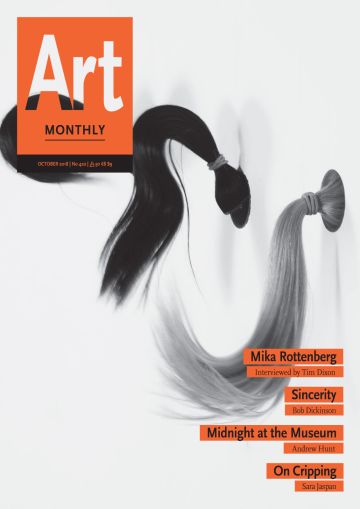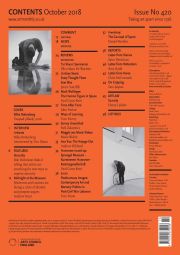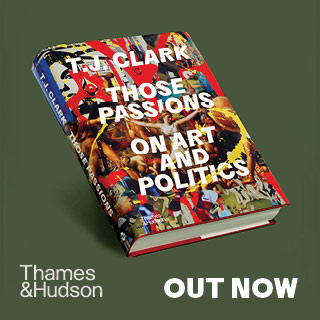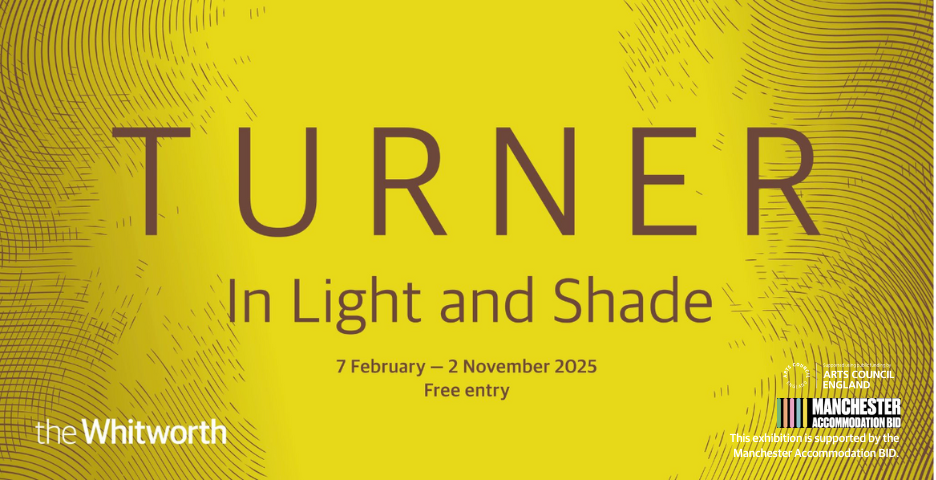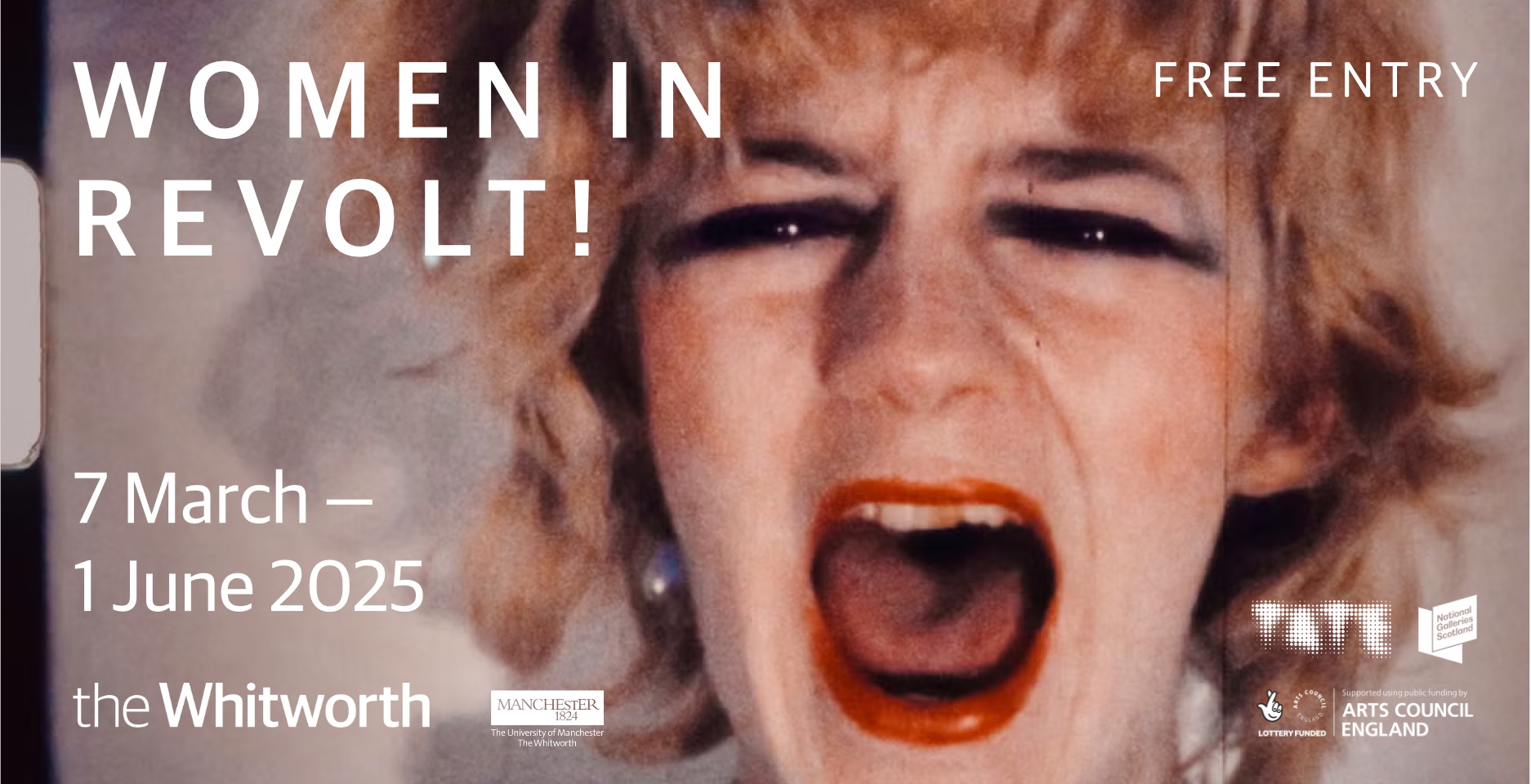Art Monthly 420
October 2018
Mika Rottenberg
Interviewed by Tim Dixon
Sincerity
Bob Dickinson
Midnight at the Museum
Andrew Hunt
On Cripping
Sara Jaspan
Buy Now – select:
Want to read this right now?
Get instant access to the entire back catalogue via Exact Editions from only £8.99!
Contents
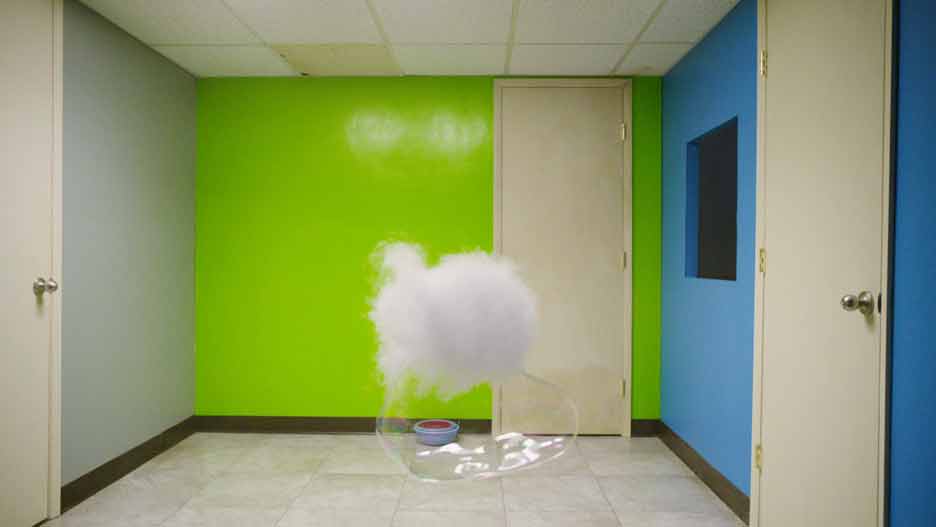
Mika Rottenberg NoNoseKnows 2015
on show at Goldsmiths CCA, London
Interview
Irritants
Mika Rottenberg interviewed by Tim Dixon
The Argentina-born, New York-based artist discusses artists as irritants, women’s hidden labour, and the difference between art and activism.
That is the difference between being an artist and being a social activist, where your role is to make a specific change. Art has more layers, because it is also about your place within it and how you play to these systems. It’s a bit of an experiment in the end.
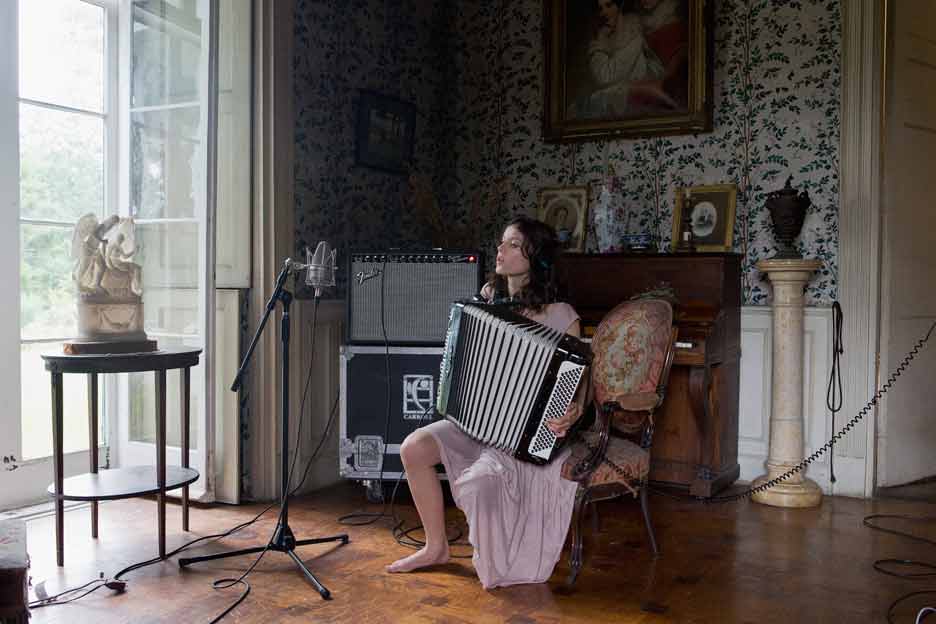
Ragnar Kjartansson The Visitors 2012
Feature
Sincerity
Bob Dickinson finds it telling that artists are searching for new ways to express sincerity
In an era of fake news and famous fibs, the work of artists ranging from Anne Imhof and Isaac Julien to Brian Griffiths, Andy Holden and Ragnar Kjartansson all seem to raise the question: can sincerity be achieved without irony?
Sincerity is offered in lieu of authority. All of these works are a bringing together of personnel, offering impermanent and incomplete provisional space and time to balance (rather than directly challenge) dominant cultural forms and tools with something personal, shareable, intended and meant.
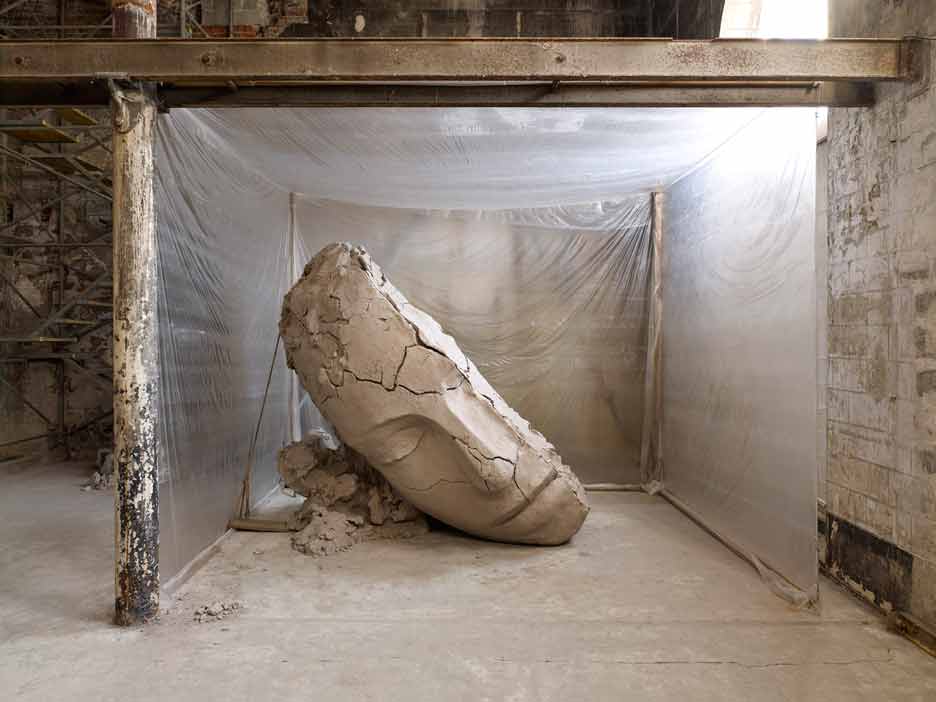
Mark Manders Dry Clay Head 2015
Feature
Midnight at the Museum
Museums and curators are facing a crisis of identity and purpose argues Andrew Hunt
In the light of the current slew of new publications and conferences on museum discourse, is it time to ask what will the future be like after the new institutionalism?
If digital documentation in museums now has a much wider audience than exhibitions, and communication and connectivity are enforced (museums are now places that don’t leave us alone), museums enact a constant form of unethical participatory theatre, in which visitors are unwitting collaborators in the spectacle.
Comment
Editorial
Education, Education, Education
The Americanisation of British politics following Tony Blair’s quasi presidential reign is perhaps no surprise, given the connections between the UK’s political elite and US universities. But after all that education, couldn’t they figure out that US-style higher-education fees are regressive, both socially and economically?
Surprise, surprise – it turns out that it would have been cheaper, more efficient, as well as more democratic to have left the grants system in place all along.
Artnotes
Tarnished
Bangladeshi photographer Shahidul Alam, who has shown at Tate Modern and the Whitechapel Gallery, has been arrested and tortured in Bangladesh for ‘tarnishing the image of the state’; Pussy Riot activist Pyotr Verzilov has been admitted into intensive care suffering symptoms that resemble nerve-agent poisoning; Weisbaden Biennale has had its controversial statue of Turkish president Recep Tayyip Erdogan removed by authorities; Belgian artist Jan Fabre has been accused of sexual harassment; the number of pupils taking art GCSEs continues to drop; the opening of Goldsmiths CCA is picketed by Justice for Cleaners protesters; Dutch activists celebrate the end of Shell’s sponsorship of the Van Gogh Museum; plus the latest news on galleries, appointments, prizes and more.
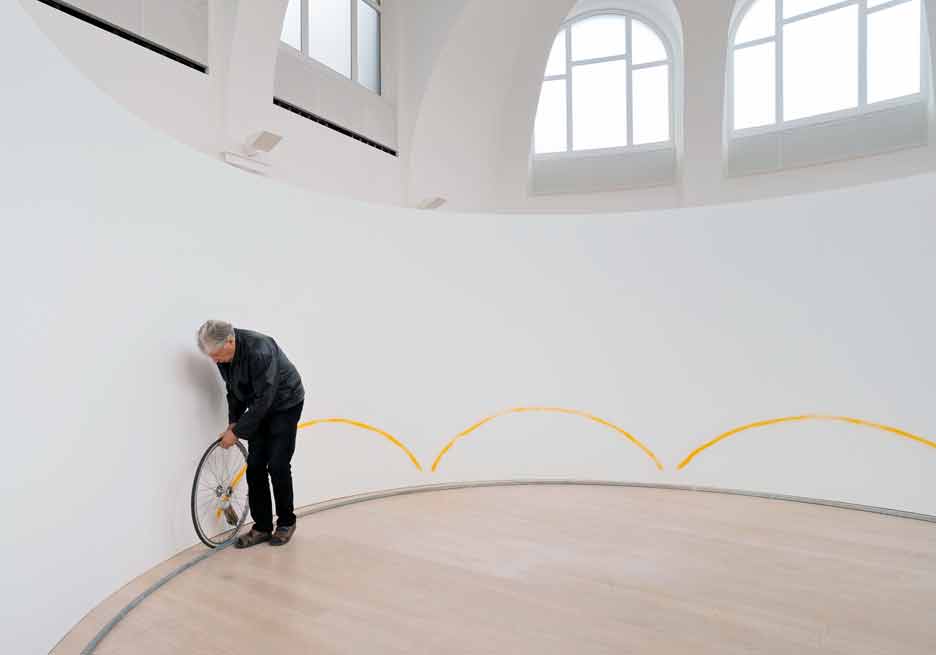
Roman Signer Round Room 2018
on show at Kestnergesellschaft in Hannover
Exhibitions
Tai Shani: Semiramis
The Tetley, Leeds
Ellen Mara De Wachter
Lindsay Seers: Every Thought There Ever Was
Focal Point Gallery, Southend-on-Sea
Jamie Sutcliffe
Mark Wallinger: The Human Figure in Space
Jerwood Gallery, Hastings
Paul Carey-Kent
Time After Time
John Hansard Gallery, Southampton
John Parton
Ways of Learning
Grand Union, Birmingham
Tom Emery
Surrey Unearthed
Surrey Hills
Neil Zakiewicz
Maggie Lee: Music Videos
Arcadia Missa, London
Maria Walsh
Ana Vaz: The Voyage Out
LUX, London
Andrew Hibbard
Hannover round-up
Sprengel Museum · Kunstverein Hannover · Kestnergesellschaft
Paul Carey-Kent
Reviews
Books
Chad Elias: Posthumous Images – Contemporary Art and Memory Politics in Post-Civil War Lebanon
Tom Snow
Another insightful aspect of Chad Elias’s analysis is the attention paid to nuanced social politics engendered in postwar civil space.
Inventory: The Counsel of Spent
Daniel Neofetou
Throughout The Counsel of Spent, the ‘dissident subjectivity’ the authors hope to cultivate is often characterised exclusively in terms of its opposition to the ruling class, rather than the autonomous logic of capital to which this class marches in lockstep.
Reports
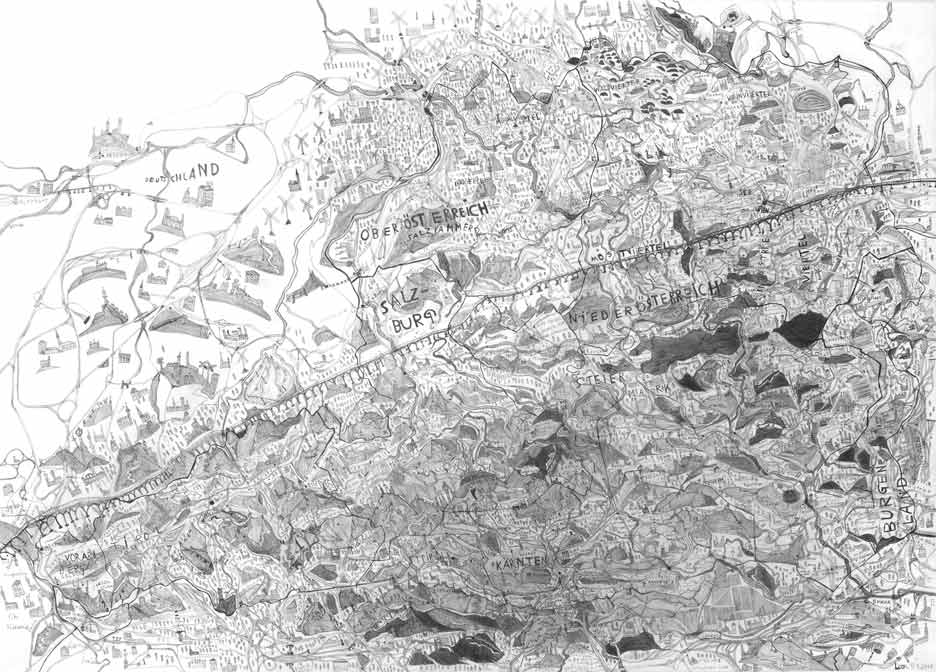
Leonhard Fink My map of Austria 2010
Letter from Vienna
Vertigo
Saim Demircan
The reason I was cycling through Klosterneuberg on that particular day was because I was en route to Museum Gugging, which houses the collection of Leo Navratil (1921-2006), a celebrated psychiatrist and author of Schizophrenia and Art.
Reports
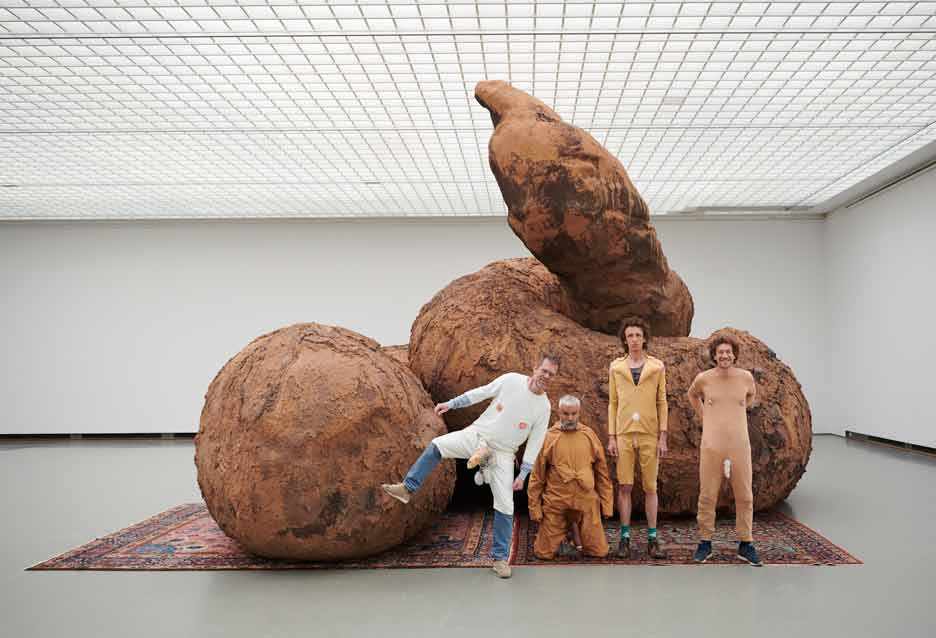
Gelitin Vorm-Fellows-Attitude 2018
Letter from Rotterdam
The Dutch Brooklyn?
Amy Budd
I comment on how I find the work to be aggressively macho and masculine, which he seemed insulted by. ‘Well,’ he said, ‘we don’t have access to menstruation.’
Reports
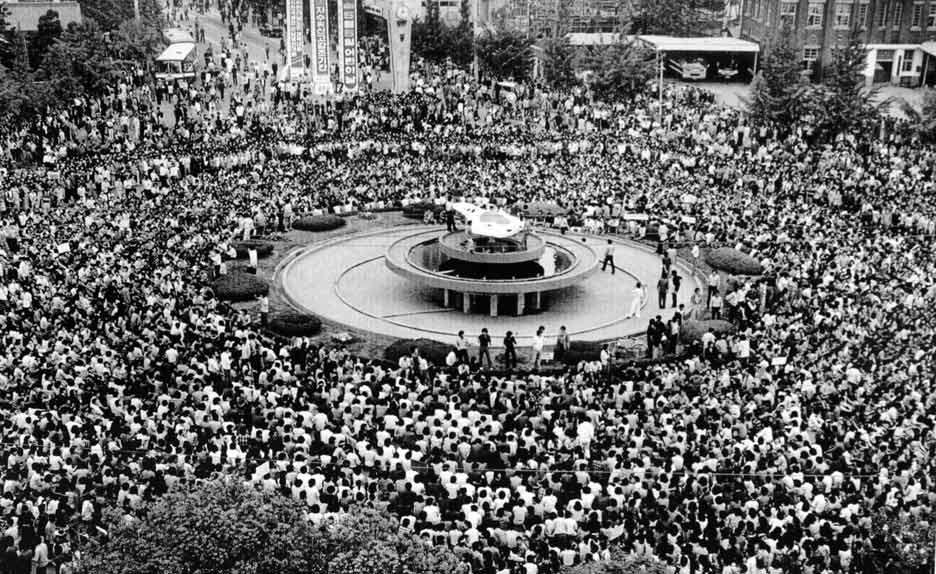
research image for Tom Nicholson’s Stranger at Fountain 2018
photo depicts the Gwangju Uprising of 18-27 May 1980
Letter from Korea
One Step at a Time
Chris McCormack
It is perhaps a curious inversion that Seoul-based chief curator, Sunjung Kim, invites us to ‘imagine’ borders when the hardest of hard borders – the mile-wide Demilitarised Zone (DMZ) no-man’s-land which separates the southern Republic of Korea from the northern Democratic People’s Republic of Korea – is so physically present.
Reports
Workshop
On Cripping
Sara Jaspan
Cripness is far from an issue confined to the art world, and the wider social invisibility and political silencing effect of chronic illness was discussed by all four speakers.
Artlaw
Ways of Working
Scarcity
Henry Lydiate
From earliest times to the present, artists have developed ways of controlling the extent of their output, often out of necessity, partly as a creative decision, and sometimes with a weather-eye on their potential sales market.
Listings
Events
Calendar
The updated events and exhibitions calendar can be viewed online.
Exhibitions
Exhibition Listings
Art Monthly's exhibition listings can be viewed online.

